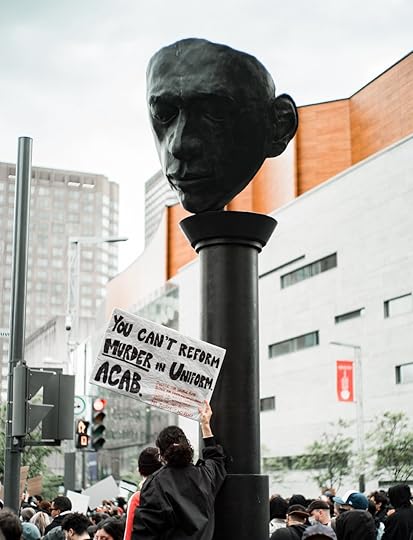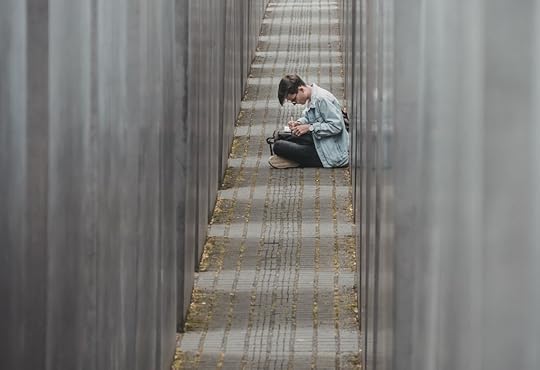Kern Carter's Blog, page 146
June 22, 2020
Look left

Look left
Sometimes there are tiny flowers that grow out of walls in the city.
I want to talk about that.
Small beings hatch out of that which is meant to crush them
I see the green, purple, blue.
There.
Just beyond my ken
This is also a current event.
This shimmer. This moment. This second.
Others will carry the necessary and didactic discussions.
Must we all?
Is it dangerous to search the skies, the pavement for resolution?
Is not revolution, going where you are not told to go,
looking away from where told to look?
There are flowers growing out of the walls.
Someone must write them.
Cock your ear.
Turn your head.
Look left.

Look left was originally published in C.R.Y on Medium, where people are continuing the conversation by highlighting and responding to this story.
Writers — Let’s talk about the basics of character building
June 19, 2020
A Rejection of Mule-ing
De n*gger woman is de mule of the world so fur as Ah can see. -Zora
The creativity of a prolific storyteller has the power to keep quotes ringing in your head. I envision Zora Neale Hurston writing this moment between the characters Janie and Nanny, in Their Eyes Were Watching God, with hope that this statement would one day no longer be true.
Until then, Zora continued writing about white people and Black men treating Black women as mules.
I think the statement has only become truer over time, which is, in part, why Black women continue to rigorously write about the current culture. Black women, like myself, often feel a duty to speak to truth to power because…I mean who else is going to do it.
Black trans and cis women vocalize their truth, their abuse, and their jubilation. They tell the world to turn an ear to it all when white folks, non-Black people of color, and Black men alike would like them to remain silent. To remain mules.
Those actors want Black women to die under wraps about the harm they themselves perpetuate. Creativity certainly is a powerful tool for truth telling though.
If you are silent about your pain, they’ll kill you and say you enjoyed it. -Zora
However, this prompt made me slow down. I didn’t stop thinking about the current culture, not by a longshot. Black women’s tireless work came to the forefront of my mind.
Vanity. Courtney. Tamika. Noname. Oluwatoyin. Marsha. Audre. Zora.
They fight/fought in their own ways to ensure that all Black people are free. Black women know the power of critically observing how people embodying misogynoir and racism protects those in power. Those who demand Black women to be mules.
 Picture of author courtesy of Sharod Bines of Retrofit Records
Picture of author courtesy of Sharod Bines of Retrofit RecordsMy own unfinished business haunts me. I haven’t typically expressed joy in my latest creative pursuits, the current work that must be done.
Everything feels like a chore.
My jaw is clenched too tight to dream.
I softened my gaze at this prompt momentarily. I considered who all are allowed unquestioned access, during the current culture, to embrace a creativity that centers imagining (future or not) and pleasure…they don’t look like me. No one requests that of me.
I asked myself, how might I fight to thrive outside, yet during this present moment in my creations? This remains complicated. While many Black women creatives desire to challenge the current culture with their imagination, they are not easily encouraged to fight in that way.
My fight consists of sustaining what I love during this time. That ardor might be the only thing I have left after the tear gas and gun smoke settles.
I choose to roll my shoulders down. Take a break from technology every now and again.
I vow to choose myself and continuously accept my inherent worth.
This is what the work of creativity also looks like. A challenge developing into a breakthrough and a break. A scream turning into an exhale.
Black women will find peace. They embrace anger and elation on their own terms.
Their creative labor is not for anyone but themselves.
Resources for Black women creatives:
Playlist- Collective Grief and Healing: Nap Ministry
Sister Outsider- Audre Lorde
@professionalblackgirl on Instagram
Hoodrat to Headwrap Podcast- Ericka Hart and Ebony Donnley
For Colored Girls Who Have Considered Suicide When the Rainbow Is Enuf- Ntozake Shange
Comment your resources for Black women creatives.

A Rejection of Mule-ing was originally published in C.R.Y on Medium, where people are continuing the conversation by highlighting and responding to this story.
June 18, 2020
Does Silence Equal Compliance?
The love you have for something has to shine through.
 Photo by Marie-Michèle Bouchard on Unsplash
Photo by Marie-Michèle Bouchard on UnsplashThe quickest answer is, no. Nevertheless, is there a grey area?
In the new world that we live in, social media is a revolutionary way of presenting yourself. Many people can come across as real or as fake as they see fit. You can photoshop a face you never had, to a place you never went, and a life you have never lived. When it comes to creativity, there is little to no difference.
The idea for this article came when I was having a quarantined Sunday Brunch with my sister. She was telling me about her childhood friend of ten years, who had seen the #blackout on the social media platform, Instagram.
The friend had noticed how the most racist people in her school had posted their own support towards the black lives matter movement. She was flabbergasted. She spoke on how these were the same individuals who had perpetrated years and years of inexcusable ‘banter’ — a cover many racists use to invalidate your response to their racist comments. The comments underneath the photo praised these individuals, calling them ‘game-changers’, ‘woke’ and ‘ the people we need to see’. It was ridiculous.
There is a chance that these individuals have changed. Became better. Looked within themselves. Reflected on their actions. Although, I think it is fair to look at the possibility that they have not ‘changed the game’ or ‘woken up’ yet.
 Photo by Clay Banks on Unsplash
Photo by Clay Banks on UnsplashThe fact that I am trying to point out here is:
If you do not know how to align yourself with culture, then do not produce creativity for the sake of it. Do not be fake. Be authentic.
As a writer, the stories that get the highest views, the best responses or the greatest wins are the real ones. The ones I was scared to write. The ones that were so personal to me that it was as if I was putting my heart out only to watch it get trampled. If you have passion behind the political message you want to share, it will be felt in your work. Your voice will be different. It will relate to readers more. It will jump across the screen, canvas, or Instagram post, it will shine through.
 Photo by Nik Shuliahin on Unsplash
Photo by Nik Shuliahin on UnsplashYour creativity. Your art. The whole point of it is that it is yours. You are the only one that enjoys it. That is probably why you got into it, right? It satisfied you. Do not cloud your mind with other people’s opinions on what you should be producing. It is your product.
Silence = ComplianceHowever, if you do not use your platform to spread these messages, you can be seen as standing by the ‘man’. People say you have always had an answer. Silence is an answer. It can show that you are not supporting people that need to be helped. But, these posts on Instagram are great for spreading awareness, but we are now at a point in history when it is time for a change. People have picked what ground they stand on. The right side of history or not. You may not spread awareness with your art but when it comes to conversation, you need to impact society, send a message yourself, and through your art if it needs to be.
Clouding mindsPeople have become victims of omniscience. Wanting to understand everything. To be known as “woke”. Be accepted by all people. Be able to relate to everyone we know on a deeply personal level. But I disagree. You do not have to know everything. Let the people who know about the experience speak for themselves. Instead of hogging the stage to yourself, give the mic to someone else. Someone who has so much to say on the topic who has thought and meditated on a subject. It is only our own selfish desire to be all things that keep us from helping others onto the podium we have created for ourselves.
 Photo by Noah Buscher on Unsplash
Photo by Noah Buscher on UnsplashHowever, for yourself. Look within yourself. Check yourself before someone else has to. In recent months, we have seen how celebrities have been wiped away from the face of the earth by what they have said, done, and supported on a plethora of problems they can not relate to. When you come into someone else’s space, respect them. Respect the space you have been invited to.
The current climate is not what art is about. Although, I believe in the statement, ‘Art imitates life’ which I think many people have sown into themselves, therefore, forcing art that does not speak to them. I believe art expresses what you have going on inside, what you want to — cheesy as it sounds — have to say to the world. If you share what is authentically brewing in your heart, then you can even change culture with your art. Art is about writing saying something you have to say if you have nothing to create you have little to say. You have not created real art.

Does Silence Equal Compliance? was originally published in C.R.Y on Medium, where people are continuing the conversation by highlighting and responding to this story.
June 17, 2020
Give your idea some time to be fully realized
I’m definitely guilty of this sometimes. For me, it presents itself in my writing. When I’m creating my novels, I have what I believe are great ideas or a great story and I hold on to it. I want so badly to see it through that it takes me a while to be open to the fact that there may be a better story waiting to be told.
And it’s not like I totally need to scrap the idea. The novel I’m working on now, I finished the first draft thinking I nailed the plot and all I needed to do was refine. But before doing that, I took time to reflect and ask myself a few questions (not in any particular order):
Is there another way this story can go?Can I explain the plot in a simple manner or am I changing the way I explain it every time I’m asked?How can I make this story even more compelling?After I ask myself these questions, I think of the parts of my story that resonate the most — Are the characters really strong, how can I build on that scene with the mother speaking to the daughter she abandoned, does this character need to be more prevalent? The key is to separate what you feel strongly about from what actually works in the story. Those are two completely different measures.
I’m using writing as my example, but you should be taking this approach with all of your creative ideas. Allow yourself the time it takes to execute a fully-realized vision. Challenge yourself to find ways to elevate your original thoughts and approach. This means no procrastinating. Get started early so you have time to make changes, sweeping changes, if necessary.
CRY

Give your idea some time to be fully realized was originally published in C.R.Y on Medium, where people are continuing the conversation by highlighting and responding to this story.
June 15, 2020
I Read, Nigger, by Dick Gregory in the 60s
 African children. Painting by Shai Yossef
African children. Painting by Shai YossefThe title of Dick Gregory’s autobiography is shocking, I know. That’s his point.
“Dear Mamma―Wherever you are, if ever you hear the word "nigger" again, remember they are advertising my book.”
― Dick Gregory, Nigger
 The surprising message I first received in the 60s — Nigger, by Dick Gregory who was a civil rights advocate, writer, and stand up comedian in the 60s,
The surprising message I first received in the 60s — Nigger, by Dick Gregory who was a civil rights advocate, writer, and stand up comedian in the 60s,I read Nigger when I was 16 years old and spending my summer of 1967 at home with my parents and sisters, and I ask you, Mr. Gregory, what do I do now that I know? Now that I see the injustice, how do I make it better?
On vacation from an elite boarding school, I was trying to grow up so I could become rich and famous. Years later, I learned growing up is a constant process, and I’m not rich or famous after all these years.
“We thought I was going to be a great athlete, and we were wrong, and I thought I was going to be a great entertainer, and that wasn’t it either. I’m going to be an American Citizen. First class.” — Dick Gregory
But I immediately got something far more valuable from Dick Gregory’s autobiography that summer. I got perspective on the world I was living in, a view of a black man’s world.
The era of the Great White Male left me unaware that the woman I held closest to my heart was trapped in a white web of society’s plans, which did not include her.
We’re talking injustice. Grave injustice.
Nigger, was on my summer reading list. I’d read a few chapters every night and would leave it on my bedside table. When I’d get back in bed the next night, I’d find it, cover down, on the table. The first night I thought it was happenstance.
The second night I knew the title had flown in the face of the woman I loved as a second mother, the one who held me in her arms, sat by me when I was sick, and talked to me. By example Osie (pronounced O.C.) showed me how to love.
Osie May Mosely was called a maid, cook, laundress, babysitter, but what she was was a soulmate. Her soft brown arms were always cool with sweat. They’re the ones I remember clinging to as a baby. Her sturdy legs are the ones I gripped when grownups I didn’t know came to our house and I wanted to disappear.
She was the one who played I Spy with me in the kitchen when I came home from elementary school. She laughed when I spied her brown skin. Her skin wasn’t black. She was the color of hot chocolate, not licorice. I couldn’t understand a few years later when I was told to call her black. I didn’t understand categorizing human beings.
“Just being a Negro doesn’t qualify you to understand the race situation any more than being sick makes you an expert on medicine.” — Dick Gregory
Osie came running and saved me from sliding off the steep roof of our playhouse when my sheltered friend started screaming, and I got too scared to jump. Osie waited for me at the bottom of the hill of our driveway the afternoon Karen Grone, my 4th grade classmate, fainted during chorale music, and I thought she was dead, and my teacher drove me home in her old car while I was choking in tears.
Osie is the one who held my hand and walked me up the hill and sat with me in the kitchen as we ate purple popsicles until we both felt better. I’m talking about love, on both sides. I still see her in my sleep. Her voice comforts me when nothing else will.
Osie placed loving cornerstones into the building of my young gawky white life. Her smile lit up my days. Her presence erased a million disappointments. Osie May Mosley was an angel right here on earth.
And now I’m all grown up, a grandmother, with grown kids, and I still miss the happiness I felt talking to Osie, being near her, hearing her good natured snicker that slipped out of her and made everyone around her laugh with her.
I remember tragedy, too. Kissing her all over her damp face and wrapping my arms around her shoulders when she got a phone call telling her her grandson, one of those cute little twin boys who used to come to our screen door in matching overalls when they were barely old enough to walk, had drown in a hotel pool when his college football team traveled out of town.
I remember grownups shaking their heads when Osie’s son, Junior, was shot and killed by his wife, and the police didn’t even arrest her. He was her son, her child. How could his murder be ignored?
And now articles say whites are prejudice, if not racists, and I suppose we are. People can’t see what they don’t want to see, but I’m trying. I simply don’t know what to do besides pray. Help me.
Did I plead her cause to city officials when I was old enough to realize the injustice around me. I did not. Did I write letters, demanding change as a young adult? No. Did I even insist she and every other person of color be allowed into our little town’s only movie theater when I was a teen — She wanted to see The Sound of Music? No, I did not.
And today, I didn’t protest against the heartbreak of George Floyd’s murder. I cried. I had nightmares. But I stayed out of chanting COVID crowds and I prayed. Not good enough, I know. That’s why I’m pleading.
What path do I and all the others like me take? What do we do? I want to do that. I ask God to use my hands to make blacks and whites open their eyes to each other.
We need each other. Help us.
I wrote “That Was Murder” on my Facebook page and posted it in a big purple square. That was when the man who was filmed killing George Floyd had not been charged with murder. I’m not against cops. I adore cops. I need cops. You need cops. What we don’t need is killer cops.
After I posted my ‘murder’ message, a ‘friend’ said she didn’t want to speak to me anymore. Which proved again, I may not be able to please all the people all the time, but I sure can piss them off.
So, what should I do if I want to make things better, not worse?
My solution — I talk to Osie in my dreams. As an angel, dreams are the only place I feel the grace of her love. How do I keep that grace and love alive now that she’s gone, and I’m getting old, and the world is so afraid to love each other for who we are? I don’t know. God, I swear, I don’t know.
‘Use your gifts’, a voice inside my head says. So I write. ‘Listen and learn,’ the voice says, so I ask.
In his autobiography, Mr. Gregory, said, “When you have a good mother and no father, God kind of sits in. It’s not good enough, but it helps.”
I want to help. I don’t want to help just one person with my smile. Oh, please, no. Surely I have more to give than that. I want to turn the world around. Where do I start?
What can whites do to help a generation of blacks and whites who are all sharing space on this globe?
How do whites make things better, not worse?
How do blacks make things better, not worse?
I’m asking. I’m begging. You have ideas, let me hear them. My skin is thick, sort of. Actually, it’s not, but this isn’t about me, so sing out. Shout out. The world is dying to know.
 Where justice is denied, where poverty is enforced, where ignorance prevails, and where any one class is made to feel that society is an organized conspiracy to oppress, rob and degrade them, neither persons nor property will be safe. — Frederick DouglassMore quotes by Frederick Douglass
Where justice is denied, where poverty is enforced, where ignorance prevails, and where any one class is made to feel that society is an organized conspiracy to oppress, rob and degrade them, neither persons nor property will be safe. — Frederick DouglassMore quotes by Frederick Douglass“Power concedes nothing without a demand. It never did and it never will.”
“If there is no struggle, there is no progress.”
In the Words of Dick Gregory“I never believed in Santa Claus because I knew no white dude would come into my neighborhood after dark.”
“If it wasn’t for Abe Lincoln, I’d still be on the open market.”
“I never learned hate at home, or shame. I had to go to school for that.”
“I’m not a comic. I’m a humorist.”
“When I lost my rifle, the Army charged me 85 dollars. That is why in the Navy the Captain goes down with the ship.”
“You know why Madison Avenue advertising has never done well in Harlem? We’re the only ones who know what it means to be Brand X.”
“In America, with all of its evils and faults, you can still reach through the forest and see the sun. But we don’t know yet whether that sun is rising or setting for our country.”
“Riches do not delight us so much with their possession, as torment us with their loss.”
“I am really enjoying the new Martin Luther King Jr stamp — just think about all those white bigots, licking the backside of a black man.”
“I wouldn’t mind paying taxes — if I knew they were going to a friendly country.”
“We used to root for the Indians against the cavalry, because we didn’t think it was fair in the history books that when the cavalry won it was a great victory, and when the Indians won it was a massacre.”
“America will tolerate the taking of a human life without giving it a second thought. But don’t misuse a household pet.”
Dick Gregory’s obituary and summation of his life, The New York Times
 Carol McClain Craver is Motivational Writing Coach. motivatewrite@gmail.com. Her novel Max and the Big Fat Lie is from her Be Kind and Draw Series.
Carol McClain Craver is Motivational Writing Coach. motivatewrite@gmail.com. Her novel Max and the Big Fat Lie is from her Be Kind and Draw Series.
.

I Read, Nigger, by Dick Gregory in the 60s was originally published in C.R.Y on Medium, where people are continuing the conversation by highlighting and responding to this story.
Call for submissions — does creativity have to reflect current culture?
It’s impossible to ignore all that’s happening today. Protests have been going strong for weeks and have extended far beyond the U.S. As creatives, we tend to be more sensitive to our surroundings, but does that mean we are obligated to create content about current cultural situations? Or do we reserve our right to create whatever we feel in our hearts regardless of what’s happening in the world?
I’m open to different interpretations of this submission request. You can write something that answers the question directly. However, if you want to write something that reflects your feelings on the current culture, we’ll consider those pieces, also.
Same rules as always:
If you’re already a writer for CRY, go ahead and submit.If you would like to submit to this request specifically but you’re not a writer for CRY, let us know and we’ll add you as a writer.Submitting doesn’t automatically mean we’ll post. We consider several factors before posting any submissions and if you do not hear back from us within three days, that means we’ve passed on your piece.Good luck and looking forward to reading all of your submissions.

Call for submissions — does creativity have to reflect current culture? was originally published in C.R.Y on Medium, where people are continuing the conversation by highlighting and responding to this story.
June 12, 2020
Fiction writers — this is how you can market yourselves
We fiction writers are a different breed than our non-fiction brethren. We have to take a different path when it comes to how we market and promote ourselves and our novels. We aren’t writing about something we’re expert in, we’re writing from our imagination.
That discernment is crucial, and as we set out on our journeys to share what we’ve created, we want to be sure as many readers as possible are able to share in that journey, also.
With that said, I’ve put together ways in which fiction writers specifically can market and promote their work.
 HOW FICTION WRITERS CAN MARKET THEMSELVES
HOW FICTION WRITERS CAN MARKET THEMSELVESCRY

Fiction writers — this is how you can market yourselves was originally published in C.R.Y on Medium, where people are continuing the conversation by highlighting and responding to this story.
June 10, 2020
Editor offering free services to BIPOC
Editor Olivia Taylor Smith, who CRY interviewed just a short time ago, is stepping up. If you’ve got a manuscript in the works, she’s offering editorial notes on 20 pages of adult fiction or creative non-fiction/memoir to BIPOC folks (Black Indigenous People of Colour).
This is a standing offer from Olivia. If your manuscript is ready in one year from now, she’ll still provide editorial notes for 20 pages. She also runs an indie press called Unnamed and is open to receiving pitches.
You can reach Olivia at olivia@unnamedpress.com. Let her know that CRY sent you.
CRY

Editor offering free services to BIPOC was originally published in C.R.Y on Medium, where people are continuing the conversation by highlighting and responding to this story.
June 7, 2020
The #PublishingPaidMe Hashtag is Lighting Up Twitter
Twitter came alive this weekend thanks to urban fantasy author LL Mckinney (@ElleOnWoods). She started the hashtag #publishingpaidme to show the disparity between the book advances of white authors in contrast to their black counterparts.
As usual on Twitter, the conversation veered in several different directions, but McKinney always made sure to bring it back to its original intent. Make sure check out the hashtag by visiting @ElleOnWoods Twitter page.
CRY

The #PublishingPaidMe Hashtag is Lighting Up Twitter was originally published in C.R.Y on Medium, where people are continuing the conversation by highlighting and responding to this story.




